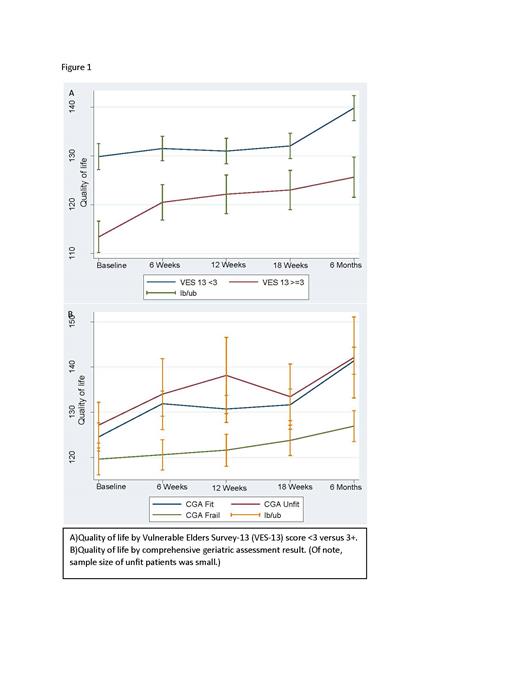Background: Older adults with aggressive non-Hodgkin lymphoma (NHL) can experience durable remissions with therapy but also substantial toxicities and healthcare utilization. The Vulnerable Elders Survey (VES-13) is a 13-item tool assessing age, self-rated health, and ability to perform physical and functional activities (score of 3+ indicates vulnerability). The Fondazione Italiana Linfomi comprehensive geriatric assessment (CGA) assesses age, comorbidities, and ability to perform physical and functional activities and classifies patients as fit, unfit, or frail. Both the VES-13 and CGA hold promise to risk stratify older adults for poor outcomes. Few data are available comparing these tools in assessing risk for poor survival and healthcare utilization, and prior studies have not examined the impact of therapy on longitudinal patient-reported outcomes (PROs).
Methods: We conducted a longitudinal prospective study of 105 older adults with aggressive NHL at Massachusetts General Hospital or the Dana-Farber Cancer Institute between 9/2020 and 1/2023. Eligible patients were age >= 65 years at time of treatment initiation receiving combination chemoimmunotherapy. Patients could enroll up until cycle 1 day 8 of therapy. Patients completed questionnaires at baseline and 6 weeks, 12 weeks, 18 weeks, and 6 months post therapy initiation assessing demographics, quality of life (QOL-Functional Assessment of Cancer Therapy-Lymphoma [FACT-Lym]), depression and anxiety (Hospital Depression and Anxiety Scale [HADS]), and physical symptoms (Edmonton Symptom Assessment Scale-revised [ESAS-r]). At baseline patients also completed the VES-13 and underwent CGA evaluated by an oncologist. We utilized linear mixed models to examine longitudinal QOL, depression, anxiety, and physical symptoms. We assessed univariate factors associated with longitudinal QOL. Using Cox regression models controlling for gender, age-adjusted International Prognostic Index (IPI), hypoalbuminemia, Charlson comorbidity index (CCI), and lymphoma subtype, we assessed the relationship of VES-13 and CGA in separate models with overall survival (OS). We also examined factors associated with unplanned hospitalization within 6 months of therapy start using logistic regression.
Results: We enrolled 106/163 (65.0%) patients. 1 patient was excluded due to treatment with an ineligible therapy. Patients had a median age of 73 years (range: 65-99, 38.1% >75, 21.9% >=80); most were male gender (64.8%), White race (96.2%), and married/with a life partner (72.4%). The most common lymphoma subtypes were DLBCL (73.0%), DLBCL/high grade B-cell lymphoma with MYC and BCL2 translocations (12.4%), and mantle cell lymphoma (10.5%). The majority (56/104, 53.8%) had an age-adjusted IPI of 2 or 3, over a third (34.3%) had a CCI score of 2+, and 82.9% had an Eastern Cooperative Oncology Group performance status (ECOG PS) of 0-1. 45.7% (48/105) had a VES-13 score of 3+. 40.0%, 9.5%, and 50.5% were fit, unfit, and frail, respectively, on CGA. QOL, depression, anxiety, and physical symptoms all improved over time (Figure 1). QOL improved regardless of age group, VES-13 category (<3 vs 3+), or CGA result (Figure 1). Compared to other patients, those 80+ years with either VES-13 score 3+ (β= -2.90, p=0.045) or frail on CGA (β= -3.68, p=0.007) had a worse QOL trajectory. Income > $50,000 annually (β=2.41; p=0.041) was associated with better QOL trajectory. VES-13 score of 3+ (HR=6.08; p=0.014) and frail on CGA (HR=5.20; p=0.028) were both associated with worse survival. Of those with follow up (N=66), 8 died within 1 year (1-year OS=87.9%), all of whom were both frail on CGA and had VES-13 score 3+. 25.8% (8/31) of the CGA frail patients and 28.6% (8/28) of those with VES-13 3+ died within 1 year. VES-13 score (OR=1.16, p=0.028) was associated with greater likelihood of unplanned hospitalization.
Conclusion: Older adults with aggressive NHL often experience improvement in QOL and other PROs with treatment, even across age and frailty categories. VES-13 score and CGA identify patient groups at high risk for early death and poor QOL trajectory, for whom novel therapies and supportive care interventions are warranted. Higher VES-13 score is also associated with higher risk of unplanned hospitalization. Routine assessment of VES-13 and CGA has high potential for early identification of high risk patients and implementation of appropriate interventions.
Disclosures
Johnson:Seagen: Consultancy; Abbvie: Consultancy; Incyte: Consultancy, Research Funding; Medically Home: Research Funding; ADC Therapeutics: Consultancy; AstraZeneca: Consultancy, Research Funding. Newcomb:Timedoc: Divested equity in a private or publicly-traded company in the past 24 months; Vertex: Current equity holder in publicly-traded company, Other: Spouse employment. El-Jawahri:Novartis: Consultancy; Incyte Corporation: Consultancy; GSK: Consultancy.


This feature is available to Subscribers Only
Sign In or Create an Account Close Modal